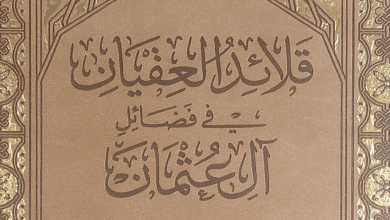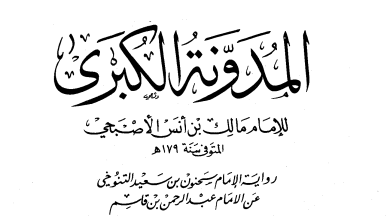Difference of the Jurists Due to Varying Degrees of Knowledge of the Sunnah
Translator’s Preface
The following is an excerpt from our abridged translation of the masterpiece, Athar al-Hadīth al-Sharīf fī Ikhtilāf al-A’immah al-Fuqahā’, by the Syrian Hadīth scholar, the teacher of our teachers, Shaykh Muhammad ‘Awwāmah. There were numerous requests for an abridged translation of the work for the benefit of non-Arabic readers, as the original work is relatively lengthy. We will post sections of it in installments and finally publish the complete abridgement in a separate post. We have previously posted the following sections of the book:
the Syrian Hadīth scholar, the teacher of our teachers, Shaykh Muhammad ‘Awwāmah. There were numerous requests for an abridged translation of the work for the benefit of non-Arabic readers, as the original work is relatively lengthy. We will post sections of it in installments and finally publish the complete abridgement in a separate post. We have previously posted the following sections of the book:
- Introduction/When is a Hadīth suitable for practice?
- The correct meaning of the statement, “When a Hadīth is authentic it is my opinion.”
- Is the authenticity of a Hadīth sufficient to practice upon it?
- Difference of the jurists in their understanding of a Hadith
- Difference of approach in dealing with apparently conflicting aspects of the Sunnah
The excerpt before you is an explanation of the fourth and final reason of differences among the jurist Imāms: varying degrees of knowledge of the Sunnah. In this chapter, the author commences by explaining that the idea of one scholar gathering the entire Sunnah independently is erroneous. He further explains that one cannot gauge at the knowledge of hadith a scholar possessed based on the amount of hadiths that he narrated. This is because a scholar does not necessarily impart every hadith he learnt. After discussing the vast amount of hadīths these Imāms were aware of, he acknowledges that there were times when they were also unaware of certain hadiths, albeit very few, for which he provides several examples. He concludes, by explaining the reason for delaying this cause as the last cause, although generally it is the first cause of difference that comes to mind when discussing the differences of the Imams. Further, he explains that often a scholar has proofs to substantiate his view, but others are unaware of them.
Towards the beginning of this chapter, the author discusses the knowledge of Imām Abū Hanīfah in the science of Hadīth. Since this discussion is quite important and well presented, we will publish it separately in a subsequent post.
It is important to remember that this is only an abridged translation. Therefore, many sections were omitted and some were summarized. To make the article more reader-friendly, an idiomatic translation was adopted in several places. Those who are interested in more detail are advised to read the original work.
Muntasir Zaman
The Fourth Cause of Difference: Difference Due to Varying Degrees of Knowledge of the Sunnah
By Shaykh Muhammad ‘Awwamah
Translated by Muntasir Zaman
I will commence this section with a quotation of Imām al-Shāfi‘ī:
We do not know of anyone who was able to gather the Sunnah in its entirety. When the knowledge of the majority of the scholars is collected, we can find the Sunnah. Conversely, when each scholar’s knowledge is separated, part of the Sunnah will be left out; what was left out from him will be present by someone else. In knowledge, they are in various categories: those who gather most of it, although they miss some, and those who gather less than others.[1]
‘Allāmah Ibn Taymiyyah [d. 728 AH] writes, “Whoever believes that every authentic narration has reached every Imām or a specific Imām, is gravely mistaken.”[2] Thus, it is not possible for anyone to claim for himself or someone else claim for him that he has collected the Sunnah in its entirety, based on the statement of Imām al-Shāfi‘ī alongside the concurrence of other scholars of research. Variance of the Imāms with regards to retention of the Sunnah and knowing it does not necessitate that the one who is more knowledgeable is more suitable to be followed, for example, because he might be superior in this respect whereas someone besides him deserves precedence due to his understanding and ability of deduction.
As for knowledge of Hadīth, it is conditional that a person reaches the ranks of ijtihād, and is acknowledged for it, as Ibn Taymiyyah mentions:
It is incorrect to say, “Whoever does not know all the Ahādīth cannot be a mujtahid, because if the prerequisite of being a mujtahid was to know every statement and action of the Prophet that relates to legal injunctions, then such a mujtahid never existed in this ummah. The peak of a scholar is to know most of them, such that he is only unaware of some details.[3]
Imām Ahmad is renowned for his excellence in this field, as is Imām Mālik, al-Shāfī‘ī, and Abū Hanīfah although some people have reservations regarding Imām Abū Hanīfah.
From one angle, the science of Hadīth is reception (tahammul) and audition (samā‘), and from another angle, it is transmission (riwāyah) and imparting (adā’). Firstly, a Hadīth scholar learns the narration from his teachers, which is termed as “tahammul,” after which he imparts it to people, which is termed as “adā’.” When he narrates excessively, people become aware of his narrations that serve as an expression of his abundant reception [i.e. of Hadīth]. Conversely, when he is engaged in other than the transmission of Hadīth, whatever he narrates occasionally will not depict the amount of his reception [i.e. of Hadīth], be it minimal or excessive.
Abū Bakr (Allāh be pleased with him) was the first man to accept Islām, the most constant in the companionship of the Prophet, and the most knowledgeable Companion. Despite all of this, only a fraction of his narrations have reached us, which do not portray that he is from the scholars of the Companions, let alone portray that he is the most knowledgeable of them.
Similar is the case of Imām Mālik whose prominence in Hadīth is as his student al-Shāfi‘ī explains, “When it comes to Hadīth, Mālik is a star.” He himself says, “I have written one hundred thousand narrations.” Likewise is the case of Imām al-Shāfi‘ī, regarding whom Imām al-Subkī writes, “Ibn Khuzaymah was asked, “Do you know any Sunnah of the Messenger of Allāh that al-Shāfi‘ī did not include in his book?” He replied, “No.”[4] [i.e. authentic Sunnah from the Ahādīth of legal injunctions, and not Ahādīth in general.]
Imām Mālik and al-Shāfi‘ī can be excused [for not narrating everything they knew] on account of their preoccupation with fiqh, imparting fiqh, ijtihād, deducing rulings, and laying out the principles of fiqh and ijtihād more than the transmission of Hadīth. This does not mean that they had scarce knowledge of Hadīth; rather, they were abundant in reception and infrequent in transmission.
In spite of this, we acknowledge that Abū Hanīfah did not independently encompass the entire Sunnah, neither did al-Shāfi‘, Mālik, Ahamd, al-Thawrī, al-Layth ibn Sa‘d, and al-Awzā‘ī independently encompass the entire Sunnah. It would be beneficial to mention several examples of how a small fraction of the Sunnah never reached some of the Imāms.
‘Isā ibn Abān mentions:
When Abū Yusuf came to Baghdad, he held the opinion of Imām Abū Hanīfah regarding the selling of awqāf (trusts). However, when Ismā‘īl Ibn ‘Ulayyah narrated to him from Ibn ‘Awn, from Nafi‘, from Ibn ‘Umar, concerning ‘Umar giving his share of Khaybar away in charity, he (Abū Yūsuf) remarked, “This cannot be opposed. If it had reached Abū Hanīfah, he would have expressed his opinion accordingly and would not oppose it.”[5]
Imām Ahmad mentions, “Al-Shāfi‘ī told us, “You are more knowledgeable than me regarding Hadīth and its transmitters. When there exists a Hadīth, inform me, be it from Basrah, Kufah or Shām, so that I may practice upon it, if it is authentic.”[6]
In al-‘Ilal al-Mutanāhiyah, Ibn al-Jawzī narrated the Hadith, “Perform Salāh behind every righteous and corrupt person” from six Companions via thirteen routes, classifying each route as weak. He then concludes with the statement of Imām Ahmad, “I have not heard of these.”[7]
These are a few examples of how some Imāms were unaware of a Hadīth or more, and those who came afterwards corrected them either in their lifetime or after their death, which is not a shortcoming on their part keeping in mind the scarcity of such instances. Thus, no one person is capable of encompassing the prophetic Sunnah. Perfection is solely for Allāh.
Addendum
Perhaps, some are wondering as to why I mentioned this cause as the last cause. I have done so deliberately, knowing well that many people repeatedly mention this cause verbally and in their works, and place it as the first cause. When they come across a Hadīth that an Imām did not practice upon, they immediately assert, “He was unaware of it, and had he known about it, he would practice upon it. No one individual is capable of encompassing the Sunnah independently.”
I never cease to be amazed by these people for two reasons:
Firstly, they do not exhaustively search the works of the Imām such that they may have the slightest proof that the Imām did not come across it, because of which he held a view contrary to it. I have heard of a scholar who used to say, “Abū Hanīfah did not come across the Hadīth, ‘There is no Salāh without the Opening of the Book [Sūrat al-Fātihah].” This is in spite of him [i.e. Imām Abū Hanīfah] narrating this Hadīth in his well-known Musnad, which was printed multiple times, commonly available, and commentated on!
If someone claims that he completely exhausted all the works of the Imām, yet he did not come across this specific Hadīth, he is still not permitted to claim that the Imām was unaware of it. This is similar to when you are searching for a Hadīth in the Sahīhs of al-Bukhārī and Muslim, but do not find it there, you cannot claim, “This is an authentic narration that the two illustrious Imāms, al-Bukhārī and Muslim, were unaware of.” If that was the case, how vast is your knowledge? What a great Imām you are yourself!
Secondly, the person who claims that the Imām was unaware of this Hadīth is merely surmising, and is falsely accusing an Imām from the Imāms of the Muslims without any evidence or proof. Did the Imām himself inform him, “I did not come across this Hadīth”?
In light of the above, to postpone this cause was natural, demanded by academia and the etiquette of Islām in relation to its scholars.
It is better for an intelligent Muslim to accuse himself instead of being bold against the Imāms by accusing them of being unaware of what people such as himself came across. How stunning is the incident of Imām Ahmad recorded by al-Bayhaqī in Manāqib al-Shāfi‘ī: Humayd ibn Ahmad al-Basrī mentions:
I was in the company of Ahmad ibn Hanbal and we were discussing a particular ruling. A person told Imām Ahmad, “O Abū Abd Allāh, there is no authentic narration in this issue! He (i.e. Imām Ahmad) said, “If there is no authentic narration in this issue, there is still the opinion of Imām al-Shāfi‘ī regarding it, and his evidence is most reliable in this.” [8]
Thereafter, Imām Ahmad told the person of an incident that took place between him and al-Shāfi‘ī, which shows that whenever al-Shāfi‘ī held an opinion, it is necessary for it to be substantiated by an evidence from the Sunnah. However, sometimes this evidence is unknown. Unknown to who? Unknown to the likes of Imām Ahmad ibn Hanbal! Imām Ahmad mentions:
I asked al-Shāfi‘ī, “What is your opinion concerning so and so issue?” He then gave me an answer, so I asked, “Where have you taken this from? Is there a narration or verse on the issue?” Thereupon, he presented an explicit narration of the Messenger of Allāh (Allāh be pleased with him).”(i.e. explicit in its content such that the words do not contain another meaning.) [9]
Imām Ahmad knew the Hadīth. In spite of this, he was unaware of the manner of deducing the ruling from it. However, he was patient and composed, which is a lofty character that every Muslim to a greater extant should inculcate.
Consider another incident of Imām Ahmad, wherein his good conduct with other Imāms manifests. Imām Ahmad mentions, “It reached me that he (Ishāq ibn Ismā‘īl al-Tālqānī) negatively mentioned ‘Abd al-Rahmān ibn Mahdī. How strange is this! Thereafter, he said in a state of anger, “What is your problem-may you be destroyed- that you speak ill of the Imāms?”[10]
Imām Taqī al-Subkī mentions:
People are of two categories: a mujtahid scholar who is capable of deducing rulings from the Qur’ān and Sunnah, or a layman who follows a scholar. The duty of the mujtahid when an occurrence takes place is to deduce the legal ruling from shar‘ī evidences. The duty of the layman is to refer to the statements of the scholars. It is not permissible for a non-mujtahid when he hears a verse of the Qur’ān or a narration that he leaves the statements of the scholars. This is because when he sees them going against it despite having knowledge of it, it is evident that they only went against it because of a proof. Allāh has mentioned, “Ask the people of the Remembrance, if you do not know.”
The intent is that when non-mujtahids, in particular the general masses, hear a verse that contains generality or non-restrictiveness, it is impermissible for them to practice upon that generality or non-restrictiveness except with the statement of the scholars. Only that person can practice upon generalities and non-restrictiveness who recognizes the abrogating and abrogated; general and specific; non-restricted and restricted; ambiguous and express; literal and metaphoric (texts).
Thereafter, he mentioned several examples from the Qur’ān and Sunnah in roughly two pages, after which he said:
This makes it clear that that merely practicing without analyzing the proofs of specification and restriction is an error…when he acknowledges that it is incorrect to practice upon the generality until ascertains whether there exist a specifying text for it, and he understands conflicting evidences, he will submit the matter to those suitable. He will also know that above every possessor of knowledge is he who is more knowledgeable. Likewise, it is inappropriate to adduce evidence from the Qur’ān until he knows from the Sunnah that which will clarify it, specify it, or restrict it. Allāh mention, “We have revealed to you the Remembrance so that you may explain to the people what has been revealed to them and perhaps they may ponder.”
Thereafter, he said, “Whoever fails to recognize the Qur’ān, Sunnah, and the opinions of the scholars, is not permitted to practice upon an evidence that hears without an Imām who will guide him.”[11]
The statements of the scholars in this regard are numerous. You will find the discussion of “whoever is not a mujtahid is a muqallid layman” towards the ending of the books of al-Usūl (principles of fiqh), and spread out in their statements in their other works.
———————————————————————————–
[1] Al-Shāfi‘ī, al-Risālah, 42-43
[2] Ibn Taymiyyah, Raf‘ al-Malām, 17
[3] Ibid., 19
[4] Al-Subkī, Ma‘nā Qaswl al-Imām al-Muttalibī, 77,106
[5] Al-Kawthari, al-Nukat al-Tarīfah, 40
[6] Al-Bayhaqī, Manāqib al-Shāfi‘ī, 528:1
[7] Ibn al-Jawzī, al-‘Ilal al-Mutanāhiyah, 418:1
[8] Al-Bayhaqī, Manāqib al-Shāfi‘ī, 154:1
[9] Ibid.
[10] Ibn Hajar, Tahdhīb al-Tahdhīb, 226:1
[11] Al-Subkī, al-Durrah al-Mudiyyah, 20







mashAllah barakAllah
May Allah reward all those responsible for spreading this amazing work of Sheikh Muhammad Awwamah hafizahullah. For any sane reader this should suffice to convince them that in following a madhab is safety of our religion.